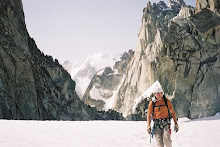Paradoxically we admire those who go to the mountains or who are able to withdraw voluntarily. We also see the ability to survive in adversity, to be physically or emotionally tough as a great asset. It was no surprise to me to read an article in the Guardian newspaper about 'great survivors' this Christmas. People who had survived extreme circumstances: such as plane crashes in the Andes Mountains. Experiences such as these are super 'real'. Survivors never forget. In a society where we are becoming more fearful of risk, riskful events seem to be more interesting to us. In a society where we are becoming more middle class and more connected we are more fearful of being disconnected or left on our own.
As we pad towards safety we occasionally look over our shoulder to see a trail of lonely footsteps in the snow. Have you seen Sean Penn's film Into the Wild? Not to be confused with The Call of the Wild, also a recently released film about adventure in Alaska. Sean Penn relates closely to the main character in his film, Chris McCandles:
It is a role, you suspect, Penn's younger self would have fought tooth and
nail to play, a character whose wanderlust and extreme attempt at
self-determination he identifies with wholeheartedly. 'Chris was a kid in search
of a place to belong,' he says, 'a place that would accept him as he was. His
quest was a quest for goodness and purity. It woke up some stuff in me, for
sure. I totally support his decision to go outside the comfort zone, even with
all the risks he took. The way I see it, whatever it takes for you to be truly
alive in this life, short of intentionally hurting someone else, you have to
do"I often think about the type of character Chris Mcandles is and am sure that there are many other young men and women like him. He is certainly not alone in his need to escape. Guy Grieve talks about his more recent experience in the wilderness of Alaska:
Three years ago I took my life into my own hands and travelled into one of
the most remote wilderness regions on earth with the intention of living there
for one year. For some time my family and I had been trapped within an all-too
common scenario, living separate lives while I commuted hundreds of miles each
week to a job I hated, in order to pay a mortgage for a house that we could not
afford. Our family life was crammed into the weekends, and was fraught with the
tension of pretending we were happy, when in fact we were screaming for escape.
Through the week, I only ever saw my children asleep, as I left before they got
up and returned after they were in bed. On a good night, if the traffic wasn't
bad, I might just fit in a bedtime story. Then Juliet and I would cram down a
meal together before we collapsed into bed, ready to start the routine all over
again the next day.Also, have you seen Will Smith in the film I am Legend? This is the third film of this story by Richard Matheson (1954) the last being the The Omega Man with Charlton Heston (1971). The story is basically the same; an individual survives against all odds. There is violence and there is lonliness. This is a film that revisits our darkest fears and basic strengths, as with 'Into the wild and Chris Mcandles'. It is not back to nature but it is a film about being lonely 'it's all about the unsettling silence, not the noise'. The type of silence Mcandles would have been comfortable with.
There also some key differences between the remakes of 1971 and 2007. The 21st century film is different in that the main character is reconstructed. In the same way that Sean Penn reconstructs a view of Ian Mcandles by describing him as a travelling philosopher, so too is Will Smith's character reinvented. He is very different from the previous 1971 character in that he does more than just survive he looks for a solution; a biological cure to a viral plague. He wants to be more than a survivor he seeks to be constructive and participative.
The winter months are a good time to reflect on risk and loneliness as integral parts of our biological makeup. In an increasingly digital and soft skills world how will this hardwiring evolve? This brings to mind that great science fiction film, 'Bladerunner' because it is about digital loneliness. The loneliness of a high spec short life military robot who is about to die. He has fantastic memories of battles in outer space and has led an exciting adventurous life. He has no real family only the painful realisation of the value of living and sharing.



No comments:
Post a Comment